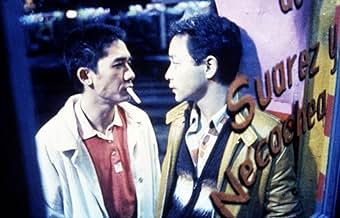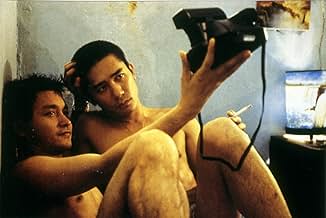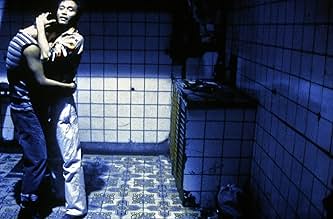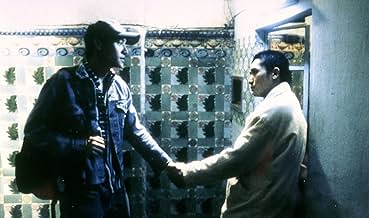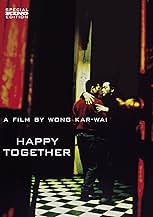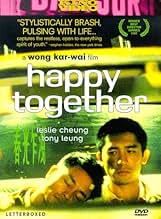Infelice e tormentato amore di due giovani gay cinesi in una livida e notturna Buenos Aires, agli antipodi della loro Hong Kong.Infelice e tormentato amore di due giovani gay cinesi in una livida e notturna Buenos Aires, agli antipodi della loro Hong Kong.Infelice e tormentato amore di due giovani gay cinesi in una livida e notturna Buenos Aires, agli antipodi della loro Hong Kong.
- Premi
- 7 vittorie e 20 candidature totali
Tony Leung Chiu-wai
- Lai Yiu-fai
- (as Tony Chiu Wai Leung)
Shirley Kwan
- Fai's Girlfriend
- (scene tagliate)
Recensioni in evidenza
Just when you thought that you knew everything about Hong Kong cinema or about romantic adventures in film, director Kar Wai Wong steps forward and eliminates all boundaries. Transforming your typical picture of a straight couple and violently handing us the relationship of Yiu-fai and Po-wing using untraditional cinematography is only scratching the surface of this picture. If you found yourself shocked by the opening sequence or annoyed by the drastic image of the film, then you definitely are not a film junkie. This movie had everything a cinephile would desire like strong characters, a non-linear story, and the brazen truth about modern society's relationships. This was more than just a gay film, but instead a story about emotions and loves, coupled with all the turmoil that surrounds it. It is ironic that the title of the film is Happy Together, because it completely challenges the true themes. It is about love, but about the difficulties that surround a dying relationship. From the visual opening to the amazing use of several different cinematography techniques, Happy Together may not suit everyone, but to this film junkie it opened a new door in Hong Kong cinema.
This film would not have worked if it weren't for the apparent brilliance of director Kar Wai Wong. While I have been impressed with his other films like In the Mood for Love and his work on the BMW series, The Hire, this film literally blew me out of the water. To begin, the opening sequence. If this very sexual opening doesn't set the tone for the rest of the film, I don't know what will. I was shocked, disturbed, and on-edge the entire time. I didn't see the love between our two characters at all in the beginning, but that was because it was to show the destruction of their relationship. Then, Wong did several things that just impressed me and kept my attention focused on the film. First, he took these two vacationing men from Hong Kong and set them in a foreign city. So, not only was it uneasy to watch this relationship disintegrate in front of our eyes, but to be lost in a unfamiliar city only made it worse. Second, he focused the camera on only one of the characters (Yiu-fai) to enhance that sensation about Po-wing's indiscretions. Through Yiu-fai we felt the human emotions just boil through of having to see a love that only hurt. Finally, he continually changed the cinematography through different scenes. This was impressive because it only added more tension to our characters and themes. Two travelers lost in a foreign country, trying to patch a dying relationship, with a constantly changing cinematic style, was tough to watch but that was the theme that Wong wanted to capture. This is not your typical romantic picture, but instead it showcases the truth about two men that perhaps were not the greatest fit. Even when he throws in the waterfall element, it only adds to the overall theme. The waterfall, to me, represented the falling relationship. Beauty on the outside, a violent tendency as the water falls just like our relationship.
Wong successfully created this tension by hiring some of Hong Kong's best actors. They carried themselves with the greatest of comfort and control. I felt as if I knew these characters by the end of the film. I felt as if I had gone through a similar struggle as they did. These two men challenged the idea of "normal" relationships, yet kept their personas simple, human, and intense. You could not help but feel emotion for these two, even if you did not like the story. They kept the tones light when they needed to be, then brought you deep within the rabbit hole when the darkness erupted. The final scenes of this film are fascinating to watch, and I had to see them again. The downfall of Yiu-fai into a role similar to Po-wing was heartbreaking, yet stunning. Here we have two men who I thought were complete opposites from the beginning, yet somehow, to quote Wong, "Turns out that lonely people are all the same."
Finally, I cannot finish without saying that the cinematography was outstanding in this film. The use of black and white in the beginning and slowly bringing in the colors was breathtaking. This film was more than just actors working for a director, but instead a director creating art. Christopher Doyle bulls-eyed the tone of the film and brought forth an intense picture that only complimented Wong's work. It just impresses me to see a film, like Happy Together, where all the elements come together and work in unison. It is a rarity in today's Hollywood, but thankfully we have directors like Kar Wai Wong whom embrace it. From the beginning of the movie until the final scenes, Doyle challenges an brings together some of the most beautiful scenes in cinema, transforming the normal into the extraordinary.
Overall, this was a spectacular film. After I watched it the first time, I had to see it again, but didn't know if I could. Its emotional strength was so overwhelming that I had to stop myself. I couldn't watch these two brilliant actors tear my heart apart again. It was a sad film, it was an angry film, but most importantly it was a film about being lost in love. Those who may have enjoyed Lost in Translation, this would be a great film to match with it. While not structured the same, it does give us that feeling of being apart in a new world, struggling to get home or to discover one's self. Wong is one of the greatest directors in the world, and I cannot wait to open my soul to his work again. Brilliant film-making, determined and unmatched acting, coupled with the best cinematography this world has ever encountered! A must for everyone!
Grade: **** out of *****
This film would not have worked if it weren't for the apparent brilliance of director Kar Wai Wong. While I have been impressed with his other films like In the Mood for Love and his work on the BMW series, The Hire, this film literally blew me out of the water. To begin, the opening sequence. If this very sexual opening doesn't set the tone for the rest of the film, I don't know what will. I was shocked, disturbed, and on-edge the entire time. I didn't see the love between our two characters at all in the beginning, but that was because it was to show the destruction of their relationship. Then, Wong did several things that just impressed me and kept my attention focused on the film. First, he took these two vacationing men from Hong Kong and set them in a foreign city. So, not only was it uneasy to watch this relationship disintegrate in front of our eyes, but to be lost in a unfamiliar city only made it worse. Second, he focused the camera on only one of the characters (Yiu-fai) to enhance that sensation about Po-wing's indiscretions. Through Yiu-fai we felt the human emotions just boil through of having to see a love that only hurt. Finally, he continually changed the cinematography through different scenes. This was impressive because it only added more tension to our characters and themes. Two travelers lost in a foreign country, trying to patch a dying relationship, with a constantly changing cinematic style, was tough to watch but that was the theme that Wong wanted to capture. This is not your typical romantic picture, but instead it showcases the truth about two men that perhaps were not the greatest fit. Even when he throws in the waterfall element, it only adds to the overall theme. The waterfall, to me, represented the falling relationship. Beauty on the outside, a violent tendency as the water falls just like our relationship.
Wong successfully created this tension by hiring some of Hong Kong's best actors. They carried themselves with the greatest of comfort and control. I felt as if I knew these characters by the end of the film. I felt as if I had gone through a similar struggle as they did. These two men challenged the idea of "normal" relationships, yet kept their personas simple, human, and intense. You could not help but feel emotion for these two, even if you did not like the story. They kept the tones light when they needed to be, then brought you deep within the rabbit hole when the darkness erupted. The final scenes of this film are fascinating to watch, and I had to see them again. The downfall of Yiu-fai into a role similar to Po-wing was heartbreaking, yet stunning. Here we have two men who I thought were complete opposites from the beginning, yet somehow, to quote Wong, "Turns out that lonely people are all the same."
Finally, I cannot finish without saying that the cinematography was outstanding in this film. The use of black and white in the beginning and slowly bringing in the colors was breathtaking. This film was more than just actors working for a director, but instead a director creating art. Christopher Doyle bulls-eyed the tone of the film and brought forth an intense picture that only complimented Wong's work. It just impresses me to see a film, like Happy Together, where all the elements come together and work in unison. It is a rarity in today's Hollywood, but thankfully we have directors like Kar Wai Wong whom embrace it. From the beginning of the movie until the final scenes, Doyle challenges an brings together some of the most beautiful scenes in cinema, transforming the normal into the extraordinary.
Overall, this was a spectacular film. After I watched it the first time, I had to see it again, but didn't know if I could. Its emotional strength was so overwhelming that I had to stop myself. I couldn't watch these two brilliant actors tear my heart apart again. It was a sad film, it was an angry film, but most importantly it was a film about being lost in love. Those who may have enjoyed Lost in Translation, this would be a great film to match with it. While not structured the same, it does give us that feeling of being apart in a new world, struggling to get home or to discover one's self. Wong is one of the greatest directors in the world, and I cannot wait to open my soul to his work again. Brilliant film-making, determined and unmatched acting, coupled with the best cinematography this world has ever encountered! A must for everyone!
Grade: **** out of *****
In "Happy Together" Director Wong Kar Wai tells us the story of a relationship that does not survive the alienation inside and outside.
The film is set in Argentina where two lovers are stranded because they don't have enough money to return to their native Hong Kong.
The film shows us that Fai and Po-wing are unable to find equality or balance in their relationship. It is a story about the way most relationships are defined by the balance of power.. and how this leads to despair. Fai reflects that their relationship was the happiest when Po-wing was ill and had to be cared for like a child. As Po Wing's health improves Fai draws away from him and refuses his attempts of closeness, illustrated by the constant battles over couch and bed. When Po-Wing is well enough to go out again by himself the balance of the power in relationship shifts. Po-wing slowly but surely slips away into the world of hustling. He never finds his way back to Fai who eventually saves enough money to go home.
Both are emotionally devastated by the loss of their lover. We only see them being happy together in a glimpse, as they dance a slow dance together in their room. It seems the happiness in their relationship that Fai refers to in connection with Po-Wing's illness, is an isolated kind of happiness that he himself enjoys without Po-wing's knowledge. If they are ever indeed Happy Together we see it only in facial expressions, in their tone of voice but these are expressions of love and tenderness that never seem to reach the surface that remain unspoken.
Wong Kar Wai's visual style is absolutely stunning. He conveys the alienation inside the relationship - and the alienation outside - (I am referring to the fact that they are in a different country) through colors and camera-movements. We are constantly looking at the protagonists from a corner high above or through the window of a seedy bar. Every single shot feels claustrophobic and it irritates the viewer. It makes the viewer long for closeness and clarity. It imitates the longing of the characters and their attempts - and failure - at connecting to each other. Their feelings, as does the eye of the lens, float above them in a silent, detached loneliness.
"Happy Together" is one of those films that I do not really enjoy watching. It is actually physically painful to watch because it hurts the eye as much as it hurts the soul. The film makes its style and subject matter into one flesh, a "happy" marriage of form and content.
9/10
The film is set in Argentina where two lovers are stranded because they don't have enough money to return to their native Hong Kong.
The film shows us that Fai and Po-wing are unable to find equality or balance in their relationship. It is a story about the way most relationships are defined by the balance of power.. and how this leads to despair. Fai reflects that their relationship was the happiest when Po-wing was ill and had to be cared for like a child. As Po Wing's health improves Fai draws away from him and refuses his attempts of closeness, illustrated by the constant battles over couch and bed. When Po-Wing is well enough to go out again by himself the balance of the power in relationship shifts. Po-wing slowly but surely slips away into the world of hustling. He never finds his way back to Fai who eventually saves enough money to go home.
Both are emotionally devastated by the loss of their lover. We only see them being happy together in a glimpse, as they dance a slow dance together in their room. It seems the happiness in their relationship that Fai refers to in connection with Po-Wing's illness, is an isolated kind of happiness that he himself enjoys without Po-wing's knowledge. If they are ever indeed Happy Together we see it only in facial expressions, in their tone of voice but these are expressions of love and tenderness that never seem to reach the surface that remain unspoken.
Wong Kar Wai's visual style is absolutely stunning. He conveys the alienation inside the relationship - and the alienation outside - (I am referring to the fact that they are in a different country) through colors and camera-movements. We are constantly looking at the protagonists from a corner high above or through the window of a seedy bar. Every single shot feels claustrophobic and it irritates the viewer. It makes the viewer long for closeness and clarity. It imitates the longing of the characters and their attempts - and failure - at connecting to each other. Their feelings, as does the eye of the lens, float above them in a silent, detached loneliness.
"Happy Together" is one of those films that I do not really enjoy watching. It is actually physically painful to watch because it hurts the eye as much as it hurts the soul. The film makes its style and subject matter into one flesh, a "happy" marriage of form and content.
9/10
Aw-kommon's notes on "Happy Together" are typical of those who cannot approach a film without aligning it with definite paradigms and secure standards. In this case, the paradigm is "Midnight Cowboy" -- a film that belongs to a totally different genre, was written and shot according to "naturalistic" procedures of Hollywood commercial cinema and, most of all, deals with romance from a quite different perspective. In "Midnight Cowboy" redemption of homoeroticism comes through death, a strategy that was quite revealing of the morals that prevailed at the time the movie was produced. "Happy Together", on the other hand, deals with romance as if it could have been homo-, hetero- or whatever, and even though homoeroticism is such an essential element to the narrative, the protagonists'love affair is a pretext for the emergence of their decentered identities, their search for love and friendship and, most important, it ends on a note of hope of future encounters. All that in a poetic tone, one that demands a continuous esthetic reconstruction, hardly understood (or accepted) by those who are encapsulated in a world of conventional filmmaking.
A poignant portrait of a relationship between two men uprooted from their home country, Happy Together explores the ups and downs, the pros and cons of commitment, as the lead characters careen and collide against each other with their discordant personalities acted out wonderfully.
Happy Together is a throbbing, raw, and profoundly nostalgic lament from two displaced traveling Chinamen yearning for emotional soundness, for their homeland, and for each other. Wong doesn't front us any of the flickering that can still be struck between lovers who fight all the time. There is no deep poetic interpretation of the story itself, but by leaving so much unsaid, writer-director Wong Kar-Wai doesn't make the misstep of suffocating his characters' relationship with trite soap dialogue. That is not to say, however, that the film even remotely knows the meaning of the phrase "less is more."
You don't watch this film as much as seize on to it. Letting it yank you every which way is a raucous yet intriguing excursion, with fertile visual stylizations that trail you long after seeing the film, all with the impact to communicate directly with the heart. The visuals make the film come alive, and make material the displacement, and thus the unhinging, that the main characters feel from their surroundings and each other. Rather than using dialogue, this highly stylized romance chiefly imparts its themes and moods through its images, and Wong fashions an interior audiovisual composition about the mood swings of a love affair. Wong's use of images for purely emotional photogenic value, feverish camera movements, jukebox soundtrack and his improvisation and experimentation with the actors have an effect reminiscent of Scorsese's Mean Streets. In Wong's emotional roller coaster of a film, the characters seem to have a formidable intuitive certainty that their relationship is star- crossed sooner or later, but they follow passionate impulses regardless, giving the film a dreamy texture that it can't shake as its lovers turn-step to and fro during their free-form Argentine spree.
Wong gradually layers the relationship, just like it would happen in real life, and the doubts and obscurities are constant. He extracts powerful performances from his lead actors. While Leslie Cheung gracefully fluctuates his moments between yearning, resentment, and anger, Tony Leung Chiu-Wai is the calm eye of the storm.
Leung acts from the inside. We intuit his feelings through his natural physical subtleties, chiefly through the sensitive eyes. Even purely physical scenes, like the fights he has with Leslie Cheung's character, don't happen suddenly. Leung winds up for these moments instinctively and then defensively underplays them. And when the tears come, they pour without affectation, making me wonder from what part of Leung's soul he quietly unearths these moments from as Wong rolls the camera.
You don't watch this film as much as seize on to it. Letting it yank you every which way is a raucous yet intriguing excursion, with fertile visual stylizations that trail you long after seeing the film, all with the impact to communicate directly with the heart. The visuals make the film come alive, and make material the displacement, and thus the unhinging, that the main characters feel from their surroundings and each other. Rather than using dialogue, this highly stylized romance chiefly imparts its themes and moods through its images, and Wong fashions an interior audiovisual composition about the mood swings of a love affair. Wong's use of images for purely emotional photogenic value, feverish camera movements, jukebox soundtrack and his improvisation and experimentation with the actors have an effect reminiscent of Scorsese's Mean Streets. In Wong's emotional roller coaster of a film, the characters seem to have a formidable intuitive certainty that their relationship is star- crossed sooner or later, but they follow passionate impulses regardless, giving the film a dreamy texture that it can't shake as its lovers turn-step to and fro during their free-form Argentine spree.
Wong gradually layers the relationship, just like it would happen in real life, and the doubts and obscurities are constant. He extracts powerful performances from his lead actors. While Leslie Cheung gracefully fluctuates his moments between yearning, resentment, and anger, Tony Leung Chiu-Wai is the calm eye of the storm.
Leung acts from the inside. We intuit his feelings through his natural physical subtleties, chiefly through the sensitive eyes. Even purely physical scenes, like the fights he has with Leslie Cheung's character, don't happen suddenly. Leung winds up for these moments instinctively and then defensively underplays them. And when the tears come, they pour without affectation, making me wonder from what part of Leung's soul he quietly unearths these moments from as Wong rolls the camera.
Lo sapevi?
- QuizChang Chen's storyline was completely improvised. Director Wong Kar-Wai discovered the restaurant, China Central, by chance and, seizing Leslie Cheung's absence due to a concert tour, decided to keep shooting. Chang's plot was thus created.
- BlooperWhen Po-Wing knocks the packs of cigarettes off the clock, it says 2:38, but then it cuts to another angle of him doing this with the clock saying 3:33, and then it cuts again to the clock saying 2:38.
- Citazioni
Lai Yiu-fai: Turns out that lonely people are all the same.
- Curiosità sui creditiIn some prints, Jacques Picoux (the French subtitle translator) is listed twice in a row in the closing credits.
- Versioni alternativeDuring a fire accident in 2019 while the 4K digital restoration was in progress, some of the original 35mm camera negative was lost. In the ensuing months the negative was attempted to be restored as much possible, but a portion of it had been permanently damaged. Lost was not only some of the picture but also the sound in those reels. As a result, Wong had to shorten some of Tony Leung's monologues, but with the work of the restoration crew of L'Immagine Ritrovata, they managed to restore most of the scenes to better quality.
- ConnessioniFeatured in The Movie Show: Episodio datato 25 maggio 1997 (1997)
- Colonne sonoreCucurrucucu Paloma
by Caetano Veloso
I più visti
Accedi per valutare e creare un elenco di titoli salvati per ottenere consigli personalizzati
- How long is Happy Together?Powered by Alexa
Dettagli
- Data di uscita
- Paesi di origine
- Lingue
- Celebre anche come
- Happy Together. Historia de un encuentro
- Luoghi delle riprese
- Aziende produttrici
- Vedi altri crediti dell’azienda su IMDbPro
Botteghino
- Budget
- 4.200.000 USD (previsto)
- Lordo Stati Uniti e Canada
- 320.319 USD
- Lordo in tutto il mondo
- 1.539.811 USD
- Tempo di esecuzione1 ora 36 minuti
- Colore
- Mix di suoni
- Proporzioni
- 1.85 : 1
Contribuisci a questa pagina
Suggerisci una modifica o aggiungi i contenuti mancanti



